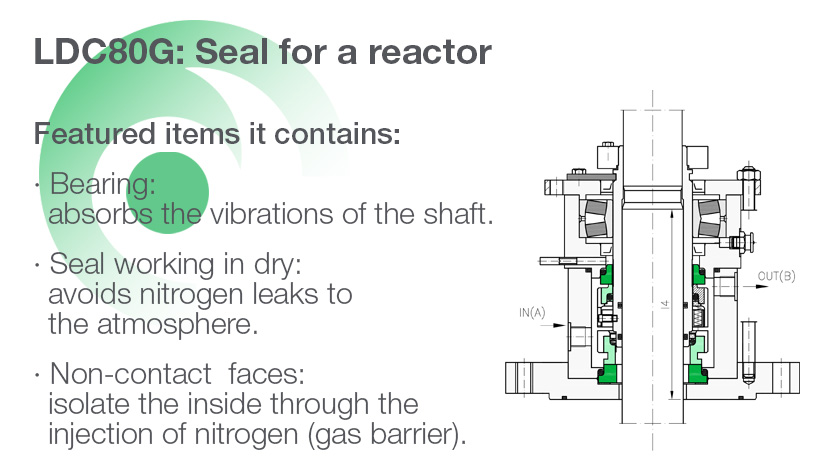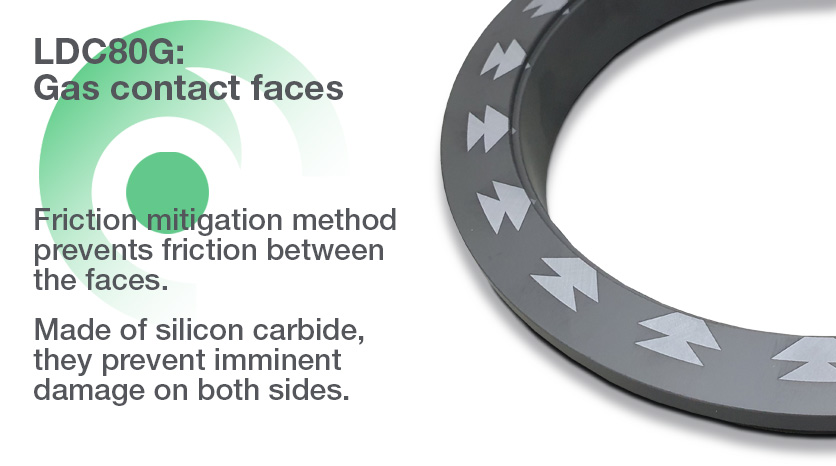Our engineering department has designed the new seal LDC80G for gas barrier reactors.
At Lidering, we count with a manufacturing and seal repairing centre that allow us to design and manufacture high performance seals.
The productive capacity of our manufacturing centre and the expertise and knowledge of our engineers have provided the possibility to present a technical solution for industrial reactors.
Keep reading to know more about the characteristics of the LDC80G seal for reactors and all the special features that make that seal an ideal solution.
Appropiate solutions for reactors
In several industries, such as the chemical or pharmaceutical sectors, there are some applications in which the product is processed within industrial reactors and must be meticulously cared for.
A reactor is a device or recipient in which different chemical processes with experimental o manufacturing targets are carried out.
Reactors, usually provided with temperature control instruments, have a mechanical seal that allow their work either at high or low pressures depending on the application.
First stages of manufacturing process are especially important because a control and monitoring of working conditions is needed so that processes are not altered and affect the product.
In the same way, the latest stages are vitally important too. Those must guarantee the product is not contaminated in any way.
Which characteristics must a mechanical seals for reactors have?
To have a guarantee of sealing on reactors, a high performance watertight special solution to isolate the product is required.
A complete isolation can only be achieved by making an inert atmosphere that guarantees the product is not affected by:
- The proper atmosphere.
- Any external contaminating element.
The way of making the inert space is by the injection of nitrogen. Nitrogen is a chemical element that is considered inert as does not react with practically any matter under certain conditions of pressure, temperature, etc.
A seal for a reactor must be the system that isolates and is able to work with a non lubricant fluid that, in this case, is nitrogen injected under pressure.
Moreover, it can not damage the integrity of the compounds and guarantee safety and high level control.
Seals for reactors require a low but constant consumption of nitrogen through the seal to the inner part of the equipment.
This consumption must be controlled mean by a flow control panel like LNFC (Lidering Nitrogen Flow Control) to guarantee the perfect work of the seal.
Once is designed, manufactured and installed, the monitoring of the operation will be the most important.
Seal for a reactor LDC80G
The new seal of a reactor LDC80G is equipped with different technologies that make it ideal for any industry needing a solution in sealing the reactors.
Featured items it contains:
- A bearing to absorb the vibrations of the shaft.
- A seal working in dry to avoid the leakage of nitrogen to the atmosphere.
- A seal with non-contact faces to isolate the inside of the system through a controlled injection of nitrogen (gas barrier).
Focusing on the last of the featured elements, we want to delve into the gas contact faces.

In the mechanical seals the use of low-resistance materials in contact faces like graphite is ruled out because they could contaminate the product through particles released by normal wear.
To alleviate these inconveniences, it is usual to use contact faces made of special materials for the specific application, such as silicon carbide.
These special designed contact faces are called “non-contact faces” because of the low friction between them.
The design used in the non-contact faces, as a friction mitigation method, works in such a way that the friction faces do not suffer any type of friction between them.
In this way, as there are two faces in silicon carbide, an imminent damage of them is avoided.
We must consider that there are different designs of non-contact faces depending on the characteristics of each application.
As you can see, a seal for a reactor must be manufactured and designed considering all the specifications and characteristics of the application.
At Lidering, we have developed a reliable and high quality seal. Our seal for a reactor with gas barrier LDC80G is ready to solve the most demanding needs from our customers.
We hope that this paper has been of your interest and, in case you still have any doubts, contact with our team of specialists.
We will be please to help you!









